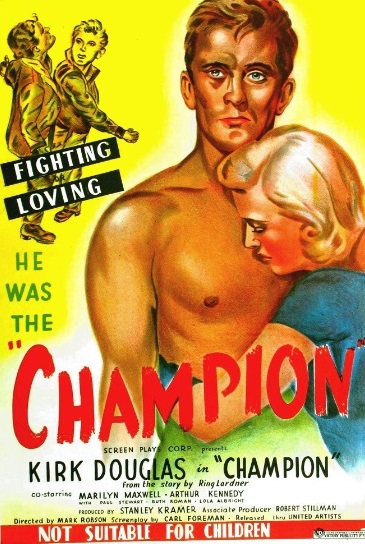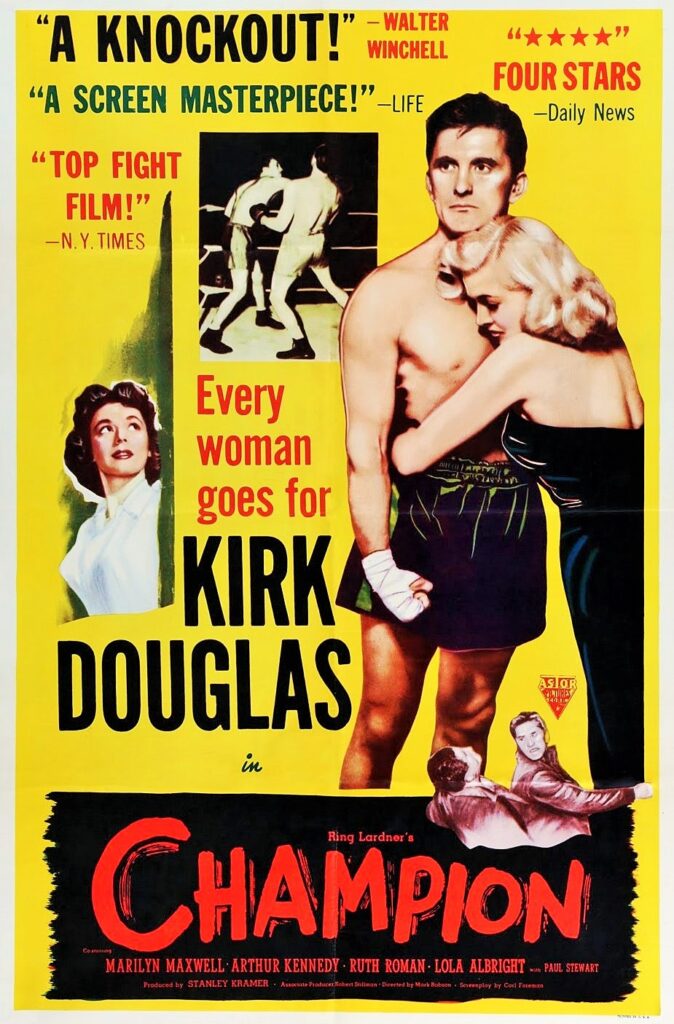[ad_1]
Some time again authors and web site contributors David Curcio and Andrew Rihn launched a brand new collection on nice combat films, with participating dialogues on such classics as Requiem For A Heavyweight, The Prizefighter And The Lady and Rocky. We’re proud to function their latest collaboration, an in-depth have a look at Champion, starring Kirk Douglas. Launched in 1949, the film is a disturbing and highly effective meditation on ruthless ambition and the excessive worth of success.
Douglas performs Midge Kelly, who seems to be down and out as he hitchhikes west along with his crippled brother to assist run a restaurant in California. However when the brothers discover themselves bussing tables and scrounging for suggestions, Midge turns to the combat recreation as his solely approach to get forward and battles his approach to the highest, within the course of breaking hearts and stabbing backs and dropping his soul. Reveling in his success and the roar of the adoring crowd, Kelly is a hero to combat followers, however a lowlife to everybody else. It’s a timeless story of ambition and greed, however depart it to our considerate scribes to resume the movie’s energy to maneuver and unsettle us, greater than seven many years after its launch. Test it out:
Andrew Rihn: Champion is predicated on a brief story by Ring Lardner, which I learn earlier than seeing the movie, and I’ve to say, that is a type of uncommon instances the place I feel the film is clearly higher than the supply materials. Inventive adaptation is a troublesome job however screenwriter Carl Foreman did a terrific job creating vivid characters and illuminating the connection between ambition and corruption with out seeming burdened or beholden to the exact particulars of Lardner’s authentic story. And whereas Champion is a bleak film, the quick story is even bleaker.
David Curcio: The apathetic brevity of Lardener’s seemingly-unfilmable quick story is, to me, the extra interesting of the 2. Revealed in 1916, even then it’s clear boxing literature leans towards the shadows: delusion, greed, and the mechanisms of crime. It follows that the identical themes apply to boxing movies, the place, even to the non-fight fan, the hero is a paradigm of the mano y mano ethos, which frequently results in a foul ending. Give it some thought: even cowboys and personal dicks normally fare higher. The pugilist is exclusive in that he’s ultimately alone in his wrestle. The very best boxing movies exhibit the methods by which any victory comes at an enormous worth: demise, defeat, age, or in one of the best state of affairs, strolling away from the sport altogether. This stress and uncertainty appeals to audiences in search of a concrete mannequin of life’s struggles and ambiguities, and the looming chance of failure. Although there’s been a current sea-change on this mannequin, no boxing movie value its salt is out to promote the game as glamorous. Nonetheless, to me, Champion crosses some form of line in its meanness.
AR: Though I’ve spent loads of time in search of out and watching some obscure boxing films, with regards to the big-name marquee footage, I’ve missed lots of them. It was years earlier than I noticed Physique and Soul, or The Set-Up, and I hadn’t watched Champion till you recommended it. What attracts you to it?

DC: I hoped you wouldn’t ask that, as a result of I’m drawn to it and I can’t determine why. Sure, Kirk Douglas embodies the odious protagonist-antagonist to perfection, so should you’re out there for what we would name cruelty porn, you may’t do a lot better than Champion. However there’s additionally this stunning, sinister environment within the pairing of cinematographer Franz Planer’s ghastly dread with Dimitri Tiompkin’s punishing rating that I discover seductive. Whereas I perceive the movie’s indispensability inside the style, its enchantment is difficult to pin down.
AR: Champion does so many issues proper, particularly on the technical moviemaking aspect. I agree concerning the cinematography and the rating: they actually promote the big selection of emotional content material within the film. The music is punishing, as you say, however there’s levity within the coaching montage. And even irony, although troublesome to convey with music, is obvious as we witness the rising break up between the principle character’s public and private lives. The rating contrasts the cruelty of boxer Midge Kelly with the sunshine fanfare as he enters the ring. And that coaching sequence! I’m fascinated by the evolution of the montage, particularly pre-Rocky. James Baldwin as soon as wrote, when masking Floyd Patterson vs Sonny Liston, that “there aren’t some ways to explain a fighter in coaching—it’s muscle and sweat and style, it’s the identical factor time and again.” The montage in Champion manages to show Baldwin incorrect.
DC: That montage might be the one mild second within the movie. That is fully as a result of Tiompkin’s transient shift away from his soundtrack of doom to a floppy, cartoonish rating. The montage itself has a storied historical past. Latvian filmmaker Sergei Eisenstein alternated ghastly imagery of a slaughterhouse with footage of a staff’ strike in his 1925 movie Strike, incomes him the distinction “Father of Montage.” Earlier than Don Siegal commenced his directing profession with the unique Invasion of the Physique Snatchers, he held the now-obsolete title of “montage director” for Warner Brothers, the place he pieced collectively scenes shot at random or left on the reducing room ground to make what he known as “some form of mishmash out of it.”
AR: For a film with such a darkish popularity — “cruelty porn,” as you say — I used to be shocked how a lot compassion I felt for Midge Kelly. Within the quick story, he’s offered as chilly and imply from the primary line. It opens with him punching his disabled brother so he can steal fifty cents from him, and he truly kicks him in his unhealthy leg and leaves him on the ground, unable to stand up. “Midge checked out him a second, then on the coin in his hand, after which went out into the road, whistling.” That’s some chilly shit. However within the film, it’s clear that Midge appears to be like out for his brother. Their relationship crumbles, and there’s a robust scene close to the tip the place Midge does punch his brother. Such a sensible transfer on the a part of Carl Foreman, the screenwriter, to retain this bitter observe however shift its place within the story. In Lardner’s model, Midge begins as principally a sociopath from line one however within the film it’s a decline and fall, which I feel is extra highly effective.

DC: It’s actually unattainable to contrive an even bigger lout than Lardner’s Midge, and also you’re proper that his film-incarnation is just not the identical bred-in-the-bone sadist. I don’t suppose a film viewers of at the moment might tolerate that diploma of cruelty. However I’m shocked by your compassion for Douglas’s Midge. Perhaps there’s a slim diploma of altruism as he’s first offered, however his deterioration is speedy. Take Connie, who Midge is fast to desert as soon as he begins combating. In fact, his career-change is smart—there’s more cash to be made in boxing than as a line prepare dinner in a diner—however what concerning the proprietor’s daughter, Emma? Midge’s pointed dismissal of the previous man’s singular caveat, “Keep away from my daughter,” is just not born of affection. He simply desires to show he can get away with it, and although he acquiesces to the shotgun marriage ceremony, he pockets the ring earlier than the vows are full. For Midge, it’s all the joys of the chase, which is actually short-lived and never a lot of a chase. The identical applies to his seduction and rejection of Grace Diamond, the would-be fatale he steals from below the nostril of the very man who gave him his first combat.
AR: Boxing tales are sometimes bildungsromans following the construction of the “hero’s journey,” tales of discovery and journey. The journey has famously been analyzed by Joseph Campbell and it begins with the hero being known as to motion and leaving residence. Campbell’s construction overlaps completely with most boxing films: there’s a mentor within the type of a trainer, then an initiation, normally the primary combat. Then the hero leaves the abnormal world for a magical or legendary one, usually success or celeb via prizefighting, and ultimately achieves the redemption that enables him to return to the abnormal world and residential. Lardner’s authentic story avoids this journey for Kelly. He’s merely a foul particular person at first and stays a foul particular person to the tip. The film, against this, follows the journey construction however retains the concept Kelly can not redeem himself. As an alternative, his redemption is definitely within the fingers of the individuals who love him, the identical folks he has damage and wronged probably the most. Not redemption truly, however forgiveness. Requested to touch upon his not too long ago deceased brother, Connie thinks about dishing the dust for a second however reconsiders, saying as an alternative that Midge was a champion and “a credit score to the combat recreation.” He glances on the others they usually appear to assent to this public absolution. But in these glances, they specific discomfort too.
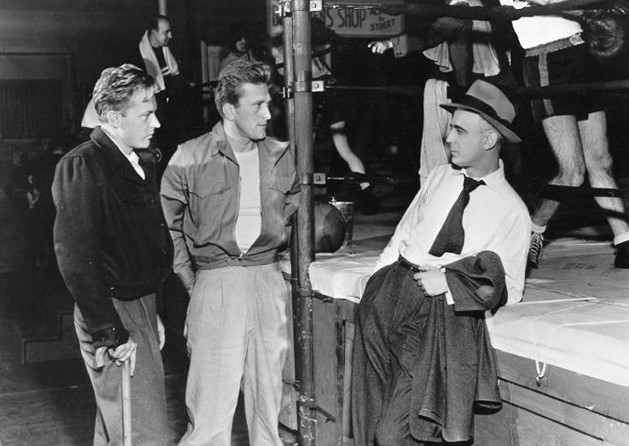
DC: The eleventh hour reward for Midge is puzzling. Contemplate Stoker from The Set-Up, launched the identical 12 months as Champion, for whom redemption is unattainable as he alone should bear his tragic flaw of delusion. However, Midge’s greed has affected so many lives that the one redemption is demise. This was actually dictated by the Hays Code, whereby sure actions –on this case, rape – might solely be rectified by dying. Nonetheless, Codes and ethical retribution apart, Midge succumbs to greed nearly instantly, a theme that’s notably conspicuous in boxing-noir, the place the hero’s journey is sort of at all times financially pushed. When you make a superb level about forgiveness vs redemption, I can not dispense both upon Midge.
AR: I didn’t discover the ending puzzling precisely, although it does depart room for interpretation. It’s not redemption; Midge is just not a modified man. It’s the folks round Midge which are selecting to be higher than he was, regardless that they discover it troublesome. I discover their unease with doing the best factor stirring. Their forgiveness is imperfect and Champion says that’s okay; myth-making doesn’t come straightforward. Now I need to pause right here and enjoy what a beautiful alternative for a reputation “Midge Kelly” is. The mouth-feel of it, the vowels and the consonants. I’ve to marvel if the screenwriter, Carl Foreman, saved this as an adaptation merely to have the ability to use that identify, that fantastic incongruous identify, for his boxer.
DC: I had by no means thought of it. Two feminized names changed into a stinging combo of aggressive consonants.
AR: Yeah, I needed to look it up: “Midge” may be quick for Margaret, or probably Michael, on this case. Anyway, Midge Kelly is actually responsible of loads of unhealthy within the movie. However then, so are the folks round him. Sure, he’s a horrible husband and abandons his spouse. However he was additionally pressured to marry her actually at gunpoint. I’ve a tough time anticipating a marriage like that to result in marital bliss of any kind. And we’re alleged to see Midge as chilly and merciless when he fires his supervisor, however he solely does so when the supervisor can’t line up any extra fights, the identical supervisor who informed him firstly “I’ll solely deal with you so long as I feel you will get someplace. I’m not inquisitive about membership fighters or fifty-dollar purses.” I’m not saying Midge is an efficient man, however typically he’s simply taking part in the hand he’s been dealt.
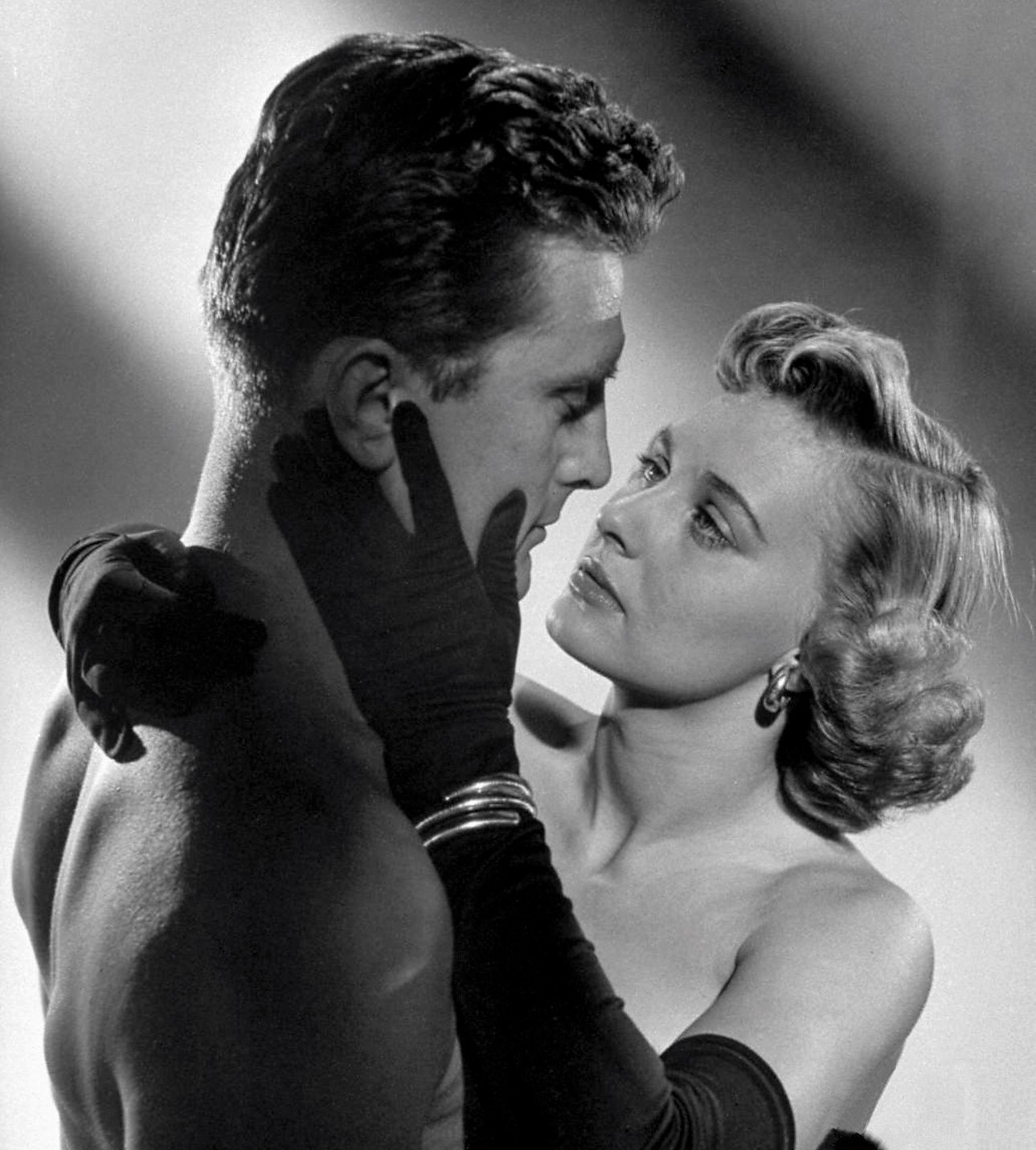
DC: Arduous-scrabble beginnings normally result in hard-scrabble heroes or, on this case, antiheroes, however Midge ranks someplace with Lex Luthor as a display screen villain. Not like Raging Bull’s berserker La Motta, he’s plodding, scheming, crafty, and at all times a step forward of his personal story. That is the facet of Champion I wrestle with. The manufacturing is flawless, but it surely’s like watching Star Wars with Darth Vader because the protagonist. What’s it that makes Midge so compelling in a style comprised largely of morality tales? As a result of he is compelling.
AR: Midge Kelly as precursor to Anakin Skywalker? That’s not a stretch. What separates Champion from so many boxing tales is that others let their protagonist wade via the corruption and cruelty of the sporting world and make it clear to the opposite aspect, whereas Midge wallows within the filth and might’t assist absorbing the worst of an unclean world. This vulgar disposition was actually inherited from the supply materials. Ring Lardner was a sports activities author and humorist however he additionally had a distinctly cynical aspect. He usually wrote about baseball and was deeply damage by the so-called “Black Sox Scandal.” Lardner tended to consider the existence of dishonest — certainly, even the opportunity of dishonest — rendered sports activities meaningless. That’s not a preferred place for a sportswriter to take.
DC: Effectively put. It’s all simply a lot extra immorality in an immoral world. Sure, there’s loads of dishonest within the film, but it surely’s not within the ring, and Midge is likely one of the few display screen fighters who proves extra harmful than the gangsters and thugs who encompass and threaten them. That’s the place Foreman’s Midge actually flexes some muscle.
AR: An odd reality about Lardner: he had 4 youngsters, all boys and all turned writers themselves. One son, Ring Lardner Jr., turned a screenwriter. He was blacklisted as a Communist throughout the Fifties as a member of the so-called Hollywood Ten and was named on the HUAC hearings by none apart from Budd Schulberg, the beloved boxing author. Carl Foreman, who wrote the screenplay for Champion, was blacklisted as properly. He refused to call names and ultimately moved to England. John Wayne would later say he would at all times be proud to have helped “run Foreman out of this nation.”
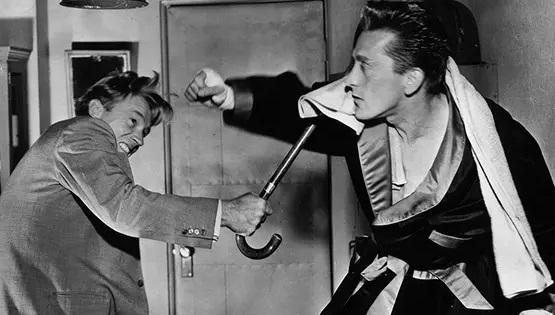
DC: Douglas contrived his personal tangled internet within the blacklist, which is intrinsic to my dislike of the actor. Perhaps for this reason I’m much less forgiving of his model of Midge. In 1960, Douglas employed blacklisted screenwriter Dalton Trumbo for Kubrick’s Spartacus, later boasting that he took on HUAC nearly single-handedly. He even wrote a e-book subtitled Breaking the Blacklist. However a 2012 article in The Atlantic tells a distinct story. To cite Trumbo’s daughter Nikola: “Douglas was paying my father solely a small fraction of what his wage would have been had he not been blacklisted.”
AR: So Douglas was making himself out to be a principled hero whereas actually simply exploiting the state of affairs for his personal profit? That’s fairly low. And fairly calculating. It’s little marvel he introduced Midge Kelly so absolutely to life on display screen. Perhaps on some degree he acknowledged that a part of himself within the character. I learn an interview he did with Roger Ebert years later and Douglas was nonetheless figuring out with boxing. “Performing is like prizefighting,” he stated. “The downtown gyms are smelly, however that’s the place the champions are.”
DC: There’s a loud ring of the disingenuous on this comparability. By the point Champion was launched, Douglas had fast-ascended to A-list standing, and whereas his biographer Thomas quotes him as having stated–with some humility–that an actor “wants nice good luck,” I don’t think about he spent a lot time in Hollywood’s equal to smelly downtown gyms.
AR: Douglas died in 2020. As with every Hollywood star, there have been loads of public eulogies and remembrances, and Champion figured closely as one among his enduring profession highlights. However there have been additionally revelations of a most sordid type, one which underscores the truth that the world of performing and flicks may be simply as ruthless and tough and exploitative as any smelly combat gyms or underworld double-dealing. And that Kelly is perhaps nearer to the real-life Douglas than anybody knew. I ponder should you can communicate to that.
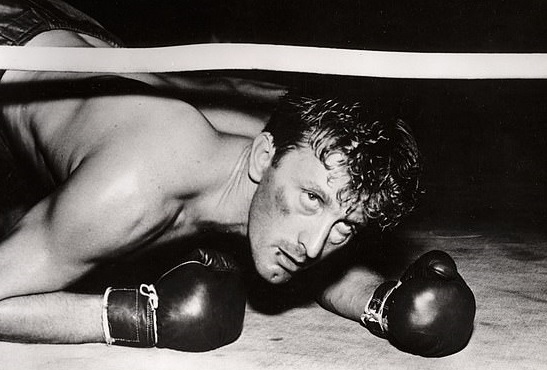
DC: I can communicate to what I’ve learn. In 2018, Natalie Wooden’s sister Lana spoke on the podcast Fatal Voyage: The Mysterious Death of Natalie Wood and recommended that Douglas raped her sister in 1955. In her 2021 memoir Little Sister: My Investigation Into the Mysterious Dying of Natalie Wooden, Lana elaborated: after a gathering on the Chateau Marmont with Douglas, her sister appeared “very matted and really upset” upon returning to the automobile the place Lana and their mom has been ready. She’d been in there for hours, and Lana states that “[s]omething unhealthy had apparently occurred to my sister.” In preparation for a separate e-book on Wooden, Indiana College professor of Media Arts Cynthia Lucia concluded that the rape “was, from what [she] understood, fairly brutal and fairly violent.” As you say, maybe the ruthlessness Douglas portrays so convincingly in Champion wasn’t such a stretch for him.
AR: I can’t assist however observe the racial facet of this, {that a} white man was shielded from going through any penalties for his actions for therefore a few years. On the similar time, Black males are put earlier than paparazzi cameras nearly instantly. Mike Tyson involves thoughts. There may be additionally a placing parallel between Midge and Douglas. Within the film, Midge receives one thing like redemption-by-proxy via his “associates,” together with the lady he raped, after demise. And Douglas, in actual life, was granted a sensible form of immunity for many years. Solely after demise was the alleged rape made public. The film is grim however the actual story, as is usually the case, is definitely darker.
DC: There’s a last level I want to handle concerning the movie’s launch. Howard Hughes, who owned RKO Studios on the time, sued producer Stanley Kramer with the declare that Champion was too shut in tone to RKO’s The Set-Up. (Champion was launched in January of 1949, The Set-Up in April.) In fact, each are boxing movies, however the similarities finish there. After a back-to-back viewing, the choose agreed, and the raging success of Champion dwarfed The Set-Up‘s field workplace consumption, most likely the results of its rags-to-riches enchantment. Hughes should have fumed all of the extra when Harry W. Gerstad, a one-time assistant to The Set-Up director Robert Clever, clinched that Oscar for Greatest Editor on Champion.
AR: Champion is unquestionably one of many darker boxing films on the market. It’s common for a boxing image to indicate some callousness and a few corruption — that’s par for the course (if I’ll borrow the language of one other sport) — however the darkness in Champion resides within the coronary heart of its important character, the stubbornly irredeemable Midge Kelly. That stated, it’s a hell of a efficiency from Douglas, buttressed by a powerful supporting solid and a few excellent film making strategies. The music, the montage, even the combat scenes. Little particulars, like referencing the way in which fights have been being broadcast on residence televisions on the time — don’t we see the Creed films doing this similar factor at the moment? At nearly 75 years previous, it feels surprisingly recent and there’s no thriller why this one is taken into account a basic.
DC: From the phobia of Douglas’s torso filling the body earlier than the rape, to the contortions and bloody dents in his distinctively angular face, it’s half boxing, half horror, and all requisite viewing. If I wasn’t in a position to make clear exactly what attracts me to it right here, I’m actually extra comfy with my ambivalence (which I attempt to make clear in my upcoming e-book Smash Hit: Race, Crime, and Tradition within the Boxing Movie) following our dialogue. —Andrew Rihn & David Curcio
[ad_2]
Source link

